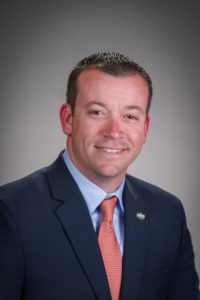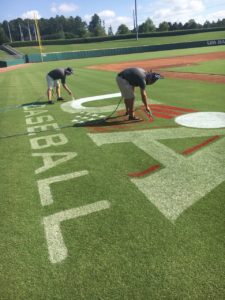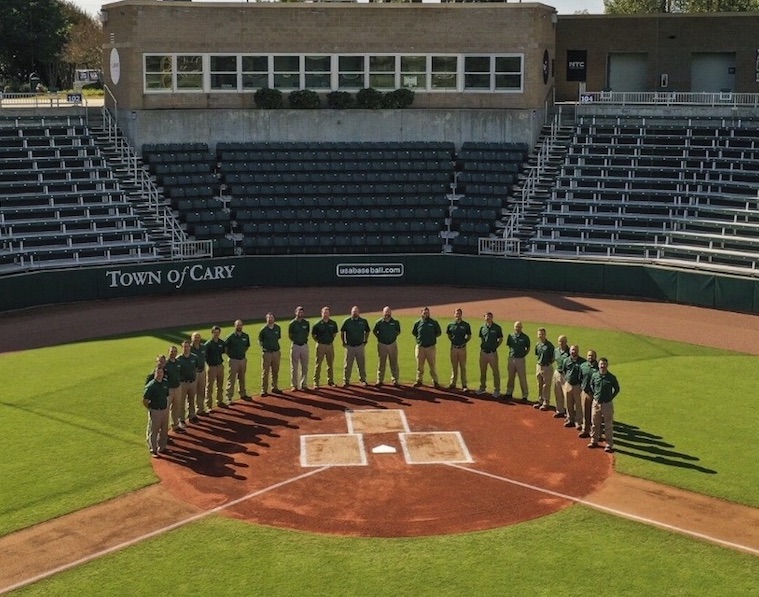By John Kmitta
For STMA President Jimmy Simpson, CSFM, facilities coordinator, Town of Cary, N.C., being a sports field manager is about making an impact – an impact on sports fans; an impact on the athletes who take to the field; an impact on crew members, staff, colleagues, and fellow sports field managers; and an impact on the entire sports field management industry.
“Our industry is about making memories for people,” said Simpson. “If it is the person who walks into a stadium for the first time, and they smell that fresh-cut grass and they look at that field, you, as a sports field manager, have an impact on that person for the rest of their lives. You are making a memory that lasts with them forever. If they are playing baseball for the first time, the sports field manager who is there plays a role in their life. The work that our members do each and every day is making a memory somewhere for someone. I would like us to start looking at things from that perspective. We are memory makers as much as we are sports field managers.”
Simpson has been making memories, and making an impact on the sports field management industry, for quite some time now, and brings his own memories, experience and insight to the role as STMA President.
A foundation for success
A native of North Carolina, Simpson always loved the game of baseball.
“But being 5’8” on a good day, my baseball career ended after high school,” said Simpson.
Still, he always found ways to be around the game. Simpson’s stepfather, Ron Davis, was a middle school baseball and basketball coach who took care of the fields at the middle school, and Simpson would help him with the work.

“It just really bonded me together with the love of baseball, the love of being outdoors, and doing the work – the instant gratification,” said Simpson.
His first job, with the City of Burlington as a 15-year-old, was to pick up trash in the parks. The following year, he joined the City of Burlington grounds crew driving a truck and trailer to 15 different fields in town.
“I prepped infields all summer long and loved it,” said Simpson. “I was playing Legion baseball in high school, and it gave me the opportunity to work the hours I could work and leave when I got everything done and go play baseball.”
When the time came for college, Simpson attended NC State on a veterans’ scholarship (his father served two tours in Vietnam).
“NC State had an agriculture extension agent in Alamance County named Rett Davis, and he was close with my stepdad,” said Simpson. “He turned me on to NC State, and it kind of came together. I tried out for the baseball team, and that didn’t work out, but it worked out really well for the turf school. It’s been a pleasure to come out of that institution, with the program that they have run and the professors that they have.”
Simpson worked for the City of Burlington during the summer following his freshman year. The following year, he received an opportunity to work with the Durham Bulls Triple-A baseball team in Durham, N.C.
“I worked in Durham that year, and enjoyed the time so much in baseball that I came back the following year. In the middle of the season, I had the opportunity to work with John Turnour, who is now with the Nationals.”
When their boss left for another job, Simpson and Turnour were offered the opportunity to finish out the season for the Bulls. At the end of the summer, Turnour moved on to the Baltimore Orioles, and the Durham Bulls offered Simpson the job.
“I still had three semesters left in school at NC State when they offered me the job,” said Simpson. “It was January of 2001, and I took that job in Triple-A baseball, and was as nervous as could be.”
Simpson said he learned a lot at Durham that gives him perspective today.
“I’m finally starting to get it, many years down the road, that it’s about the experience. It’s about everybody in the facility – not just the field and the game and the players. We are about whatever event is on our fields at the time, we do whatever we can to make it successful, and Durham was really a good basis for teaching me that.”
Following his time with the Bulls, Simpson worked at the University of South Carolina with Clark Cox, CSFM, who Simpson calls “one of the best grass growers I know.”
Approximately two years later, Simpson received the opportunity with the Town of Cary to work with USA Baseball and the WakeMed soccer park on high-level professional and high-level amateur baseball and soccer, and he will celebrate 14 years with the Town of Cary in April.
Building a team atmosphere
At the Town of Cary, as facilities coordinator, Simpson is a supervisor, but he doesn’t approach the job from that perspective.
“We try to all operate from the same level where everybody’s ideas carry the same weight,” he said. “We may not go with your idea today, but we might go with it tomorrow.”
There are 23 people in Simpson’s group. Together they manage all the athletic surfaces in town, plus the facilities for USA Baseball, WakeMed Soccer Park, Mills Park Middle School, and Middle Creek Community Park fields. The team’s responsibilities extend from the light towers to the bathrooms – everything in the facility, from top to bottom.
The team is broken down into three segments – the USA Baseball Complex, WakeMed Soccer Park, and town athletic surfaces. The group’s facilities expeditor drives the direction of the team, but the team leader ultimately controls what goes on in those facilities. Simpson coordinates all the efforts, works on projects, and works hand-in-hand with the expeditor to make sure bills are paid, and budgets are met.
“Day to day, we like to allow our on-site teams with their team leader to determine their own direction,” said Simpson. “We have a few goals that are lofty that we try to keep in the forefront of our work. We want our facilities to be the best in the country, and we want the service we provide – whether it’s to our citizens, the athletes on the field, or anyone who we may come in contact with – to be the best that we can possibly provide. We have a fantastic team that provides fantastic results.”
Simpson added that everyone on the team has things that they are really good at, and tasks that they enjoy.

“If we can compartmentalize and work with everybody’s strengths, and work to bring each other up, then our entire team gets better,” he said. “We try to let everybody have their input into the way things go, and I think that has helped build a great team and a team atmosphere.”
Simpson added that the team atmosphere is about a culture that is supportive of each other and everyone’s ideas and efforts.
Said Simpson, “You always hear, ‘If you do what you love, you’ll never work a day in your life.’ I love that statement, but I’ve also come to think, ‘If you surround yourself with good people, you’ll never work a day in your life, either.’ It’s really easy to come to work and be collaborative and share ideas.”
Simpson said the thing he is most proud of professionally is the team that has been built at the Town of Cary.
“I could walk away tomorrow and nobody would know I was gone,” he said. “And that’s the thing I would be most proud of as a person: this team can carry on and have the same goals and objectives. They are amazing people that can do it no matter what.”
Balancing work and life
According to Simpson, building a team atmosphere and building trust are vital to success in this industry.
“We have to train people, and we have to trust people,” he said. “We have to allow them to work. A lot of pressure goes away, and a lot more people want to work with you if you have an environment that is open and honest, you have good communication, create plans, and find it okay if people make mistakes.”
Simpson added that trusting others and creating a quality work/life balance is extremely important to success – as is being active in the “life” part of the “work/life” equation.
“I have two boys who are very active, and a wonderful wife who puts up with all of it,” he said. “I think our spouses in this industry are special people, because of what they put up with. Our event loads are outrageous, our hours worked are outrageous at times, and our spouses or significant others are special people. Mine is very special and she keeps us grounded.”
Simpson’s sons (Jack, age 10, and Drew, age 5) both play baseball and basketball, and Simpson spends time coaching both. The family enjoys traveling to Major League Baseball games and to the beach, being active outdoors, and spending time with family.
“We are fortunate that we live close to family – mine and hers – and family has always been big to me,” he said. “My grandmother is still with us, and my wife’s grandparents on one side are still with us. It is nice to have great-grandparents for our kids to grow up with. I was fortunate to have great-grandparents for a long time. The village truly raises the child. My wife, Natalie, keeps us all in check. If it weren’t for her, we wouldn’t know where to be, when to be, or how to be.”
Simpson said that one piece of advice that drives him forward, both at home and at work, is “Get involved.”
“If you are involved, at least you have a seat at the table,” he said.
Getting involved
Having a seat at the table is nothing new to Simpson. He is a past treasurer for the Turfgrass Council of North Carolina, past president of the North Carolina Chapter of the Sports Turf Managers Association, and has served STMA as director at-large, secretary treasurer, and president-elect prior to his new role as president. He has been a member of STMA since 2001, and was one of the first 100 people to earn the Certified Sports Field Manager (CSFM) designation, doing so at the age of 27.
“The reason I wanted to be more active in the association was because I knew that what was happening at the association level was directly affecting the work that we do,” he said. “The Turfgrass Council of North Carolina had a huge advocacy piece, and that is what drove me to work with them. The advocacy they were doing at the state legislation level impacted my daily life.”
Simpson added that the reason he got involved with the North Carolina STMA is that chapters are the lifeblood of the national association. Chapters take the message of what the national association is trying to do, and they localize that message.
“My goal is to get more people involved in chapters, more people involved in the national STMA,” he said. “I’m a huge proponent of collaboration and trying to get people to speak up. One hundred percent of the ideas you never share never get implemented, and that is tough because everybody has great ideas.”
He admitted that it is hard for people to put themselves and their ideas out there for everyone to scrutinize, but added that he hopes more people get involved, share ideas and contribute to the success of the chapters and the national association.
“The best thing for me from STMA has been the ability to collaborate with the many different people who are associated in STMA,” he said. “STMA has provided a great basis of knowledge through the Conference, through the web apps, through all the benefits of membership. But the number-one benefit for me is that I could go through the member directory right now, pick a person at random, make a phone call, and likely get a call back from that person – if I don’t talk to them directly – within 24 hours. And they will spend their time with me, not because of who I am or who they are, but because we are allied in our quest for safety for athletes, and for providing the best surfaces possible for people to play on. And it’s really a great feeling that you can pick up the phone and call 2,700 of your closest friends, and get some help. Because if there is something I’m dealing with, there is most likely a chance that they have dealt with it or know someone who has dealt with it. That tree is what makes this association special to me.”
In his new role as STMA President, Simpson said he is most looking forward to coming back to the board for another year, continuing to work with the fantastic people on the board, and working with the board on strategic initiatives.
As with his work for the Town of Cary, working as a team and sharing ideas is vitally important to the STMA Board of Directors and to the future of the industry.
The cover photo for [the February issue of SportsField Management, top] shows the Town of Cary team, because Simpson wanted to emphasize the importance of the team over any one individual. The reason the photo was taken from a drone is that Simpson was also looking for a different angle, which is important to him in both his everyday job and in his approach for STMA.
“As we move forward, we need to look at things from a different angle…a different perspective,” Simpson said of his over-arching goal for STMA. “The history of our association is amazing. It’s a rock-solid foundation. But if we don’t evolve, we are never going to be relevant in that race, and grow as an association. We are still young when you talk about associations, but we’ve been at the same membership threshold for a long time, we have done a lot of stuff the same way for a long time. I think there is time to make some changes.”
Simpson’s hope for the next year is to create that strategic vision.
“If we can get more involvement from the 2,700 members we have – sharing ideas to move the association forward in the next five, 10, 15, 20 years – that’s really what I hope to see.”
John Kmitta is associate publisher/editorial brand director of SportsField Management.
Top photo by Chuck Ruffin Photography, Anthony Campbell, FAA Certified Drone Pilot


